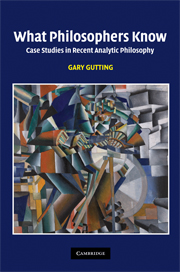Introduction
Published online by Cambridge University Press: 05 June 2012
Summary
I knew from the beginning that the title of this book would set me up as a straight man for witty colleagues: “What Philosophers Know – that'll be a short book, won't it?” Or, a bit more subtly, “Shouldn't that title be a question?”
It's not that philosophers lack disciplinary pride. They are quite impressed with how smart they are – in contrast, say, to historians, who, as a member of their clan once pointed out to me, are impressed by how much they know. Of course, the history of philosophy has at regular intervals thrown up imposing monuments of cognitive pretension. Almost every great philosopher claims to have put us on a path to sure knowledge. But the claim is always to have been the first to do this, so that each successive monument is built on the ruins of all the others. As a result, perceptive outsiders (and most insiders, for that matter) have made the disagreement of philosophers a byword.
The failure to reach agreement suggests a failure of argument. Philosophy, especially analytic philosophy, sees itself as distinctively committed to rigorous argumentation. We teach our students how to argue, claim to establish our views by argument, and criticize opponents for offering arguments that are invalid or based on dubious premises. The days are long gone when adequate philosophical argument had to be valid deduction from self-evident premises. We allow that a good philosophical argument may be inductive or based on premises expressing widely shared common-sense judgments.
Information
- Type
- Chapter
- Information
- What Philosophers KnowCase Studies in Recent Analytic Philosophy, pp. 1 - 8Publisher: Cambridge University PressPrint publication year: 2009
